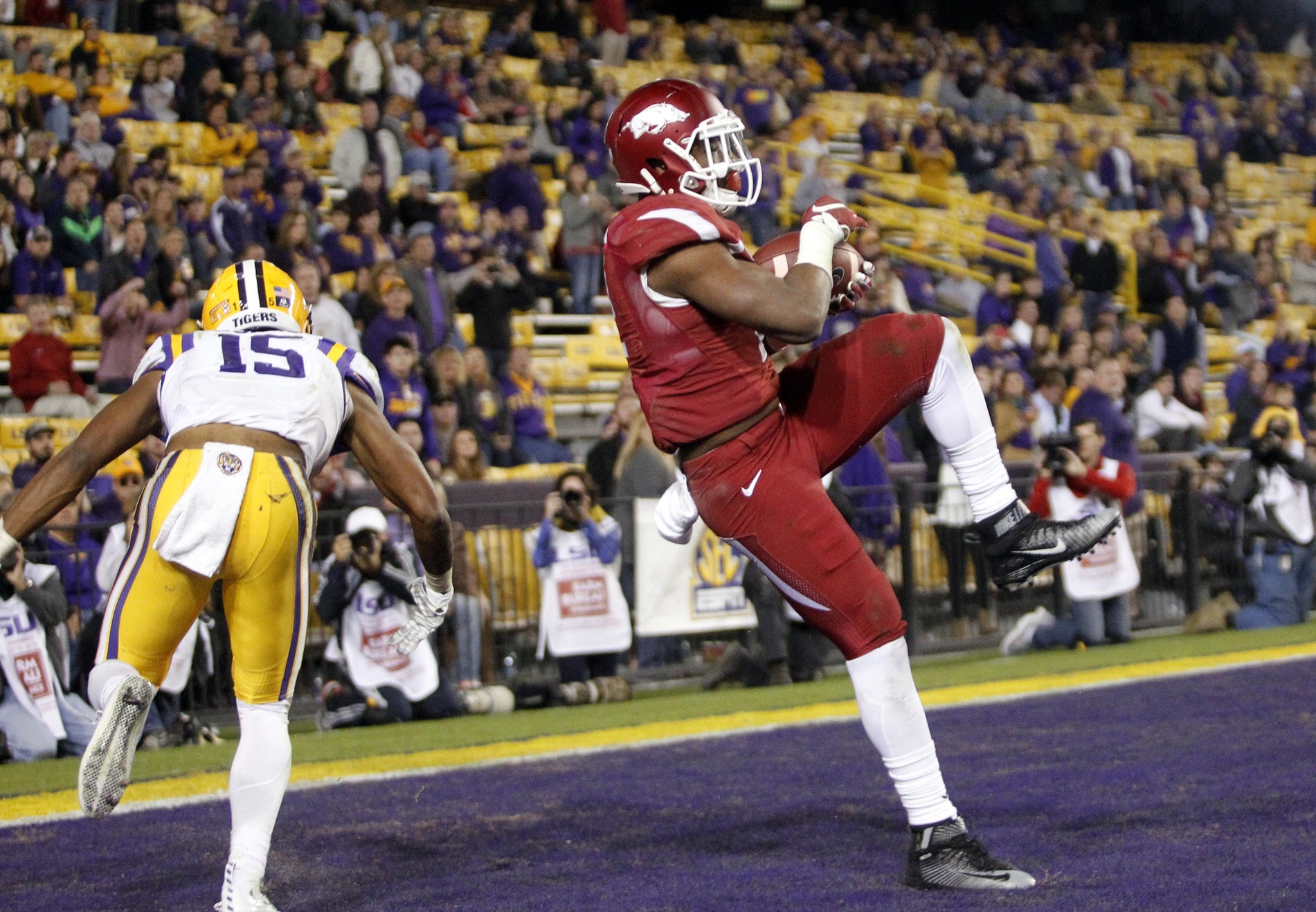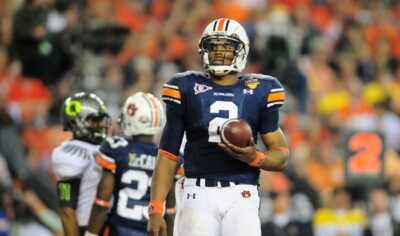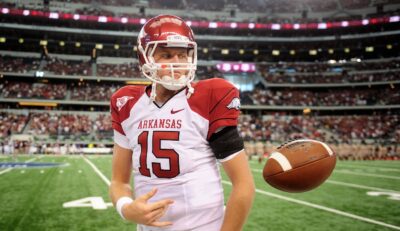
Many signs point to a rejuvenation of the Arkansas defense this season after the Razorbacks slipped from the SEC’s No. 2 overall unit in 2014 to a middling No. 11 in the conference last year.
When you consider that the Hogs finished second in the SEC at stopping the run in 2015, a picture of futility begins to formulate indicting the Arkansas secondary of being about as porous as a screen door.
The numbers aren’t pretty.
The Razorbacks coughed up more yards via the air than any other SEC team and finished No. 116 in the nation by allowing 275.2 yards per game. They led or tied the conference when it came to surrendering the most plays of 20-plus yards (53).
The 24 passing plays the Arkansas defense allowed of 30-plus yards were five more than the next-closest conference foe LSU. Missouri, for some context, allowed just seven plays of 30 yards or more through the air.
The Hogs allowed five quarterbacks to gain more than 300 yards in a game against them in 2015, while closing out the season as the SEC’s penultimate team in scoring defense — allowing 27.4 to eke out South Carolina’s 27.5 points allowed per game.
The news that the Razorbacks return all but one player from last year’s secondary is typically (and rightfully) greeted with cautious optimism. But there’s a chance the Razorbacks’ maligned defensive backs might not only be vastly improved but could also be the key to Bret Bielema’s program finally breaking through to a higher echelon in the coach’s fourth year in Fayetteville.
RHOADS
The biggest improvement comes from the sidelines with the hiring of Paul Rhoads as Bielema’s defensive backs coach. Rhoads arrives on The Hill via Iowa State where he coached the Cyclones for seven years.
His football acumen is solid, even if his Iowa State pass defenses averaged a rank of No. 7 in the Big 12 during his tenure in Ames, only once appearing in the conference’s top three (2011). Meanwhile, Iowa State ranked dead last in the 10-team conference by surrendering 282.7 yards per game.
But Rhoads — who’s also spent time as defensive coordinator at Auburn and Pittsburgh — brings with him 16 years of coaching experience on some of the highest levels of the sport. The gregarious 49-year-old also fits the Bielema mold when it comes to enthusiasm and is a player’s coach.
Among his former disciples who learned under his tutelage are six defensive backs selected in the NFL Draft, including former Pitt star Darrelle Revis.
He now gets to build a rapport with a unit that returns its core with another year’s worth of experience on the gridiron and in the weight room under their belts.
THE SECONDARY
Arkansas loses strong safety Rohan Gaines, who finished third on the team with 67 tackles. With Gaines gone, that means underclassmen Santos Ramirez and Josh Liddell, who split time at free safety last year, now likely share the safety roles. The two combined for 87 tackles (52 for Liddell).
The junior Liddell tied DJ Dean for tops on the squad with two interceptions, collectively snagging four of Arkansas’ 11 picks on the season. Dean (35 tackles) returns at the corner along with Jared Collins (44 tackles, interception), providing what should be an experienced group led by the unit’s only two seniors. Collins led the Razorbacks with nine passes broken up.
Defensive coordinator Robb Smith is known for his pass-rushing schemes. Arkansas boasts two top-tier linebackers in Brooks Ellis and Dre Greenlaw. But the duo that hails from Fayetteville High School are more at home when charging a quarterback or playing up to close the gaps. In coverage, Ellis and Greenlaw didn’t factor much in Smith’s 4-2-5 scheme, breaking up a combined four passes last year and intercepting one pass (Ellis).
That creates an impetus on Henré Toliver to solidify the nickel back slot. Toliver finished tied for fourth on the squad with 55 tackles along with defensive tackle Jeremiah Ledbetter. Toliver wasn’t perfect in 2015 but showed a knack for making big plays. He’s backed by Kevin Richardson II, who posted 44 tackles of his own.
Picked! What a play by Henre Toliver! pic.twitter.com/wa2qO50V6b
— Katelynn Gorton (@katelynngorton) September 5, 2015
OUTSIDE FACTORS
An improved Arkansas defensive line should also behoove the Razorbacks secondary by disrupting opposing passing games. That should scare opponents, as well. The 2015 Hogs were the only SEC school not to allow a rushing play of 40-plus yards.
Ledbetter led all linemen in tackles, but the heart of the unit belongs to defensive end Deatrich Wise Jr., who tallied eight sacks. Add five-star defensive end McTelvin “Sosa” Agim to a unit that returns DE Tevin Beanum (2.0 sacks), NT Taiwan Johnson (1.5 sacks) and DT T.J. Smith, who makes his debut after redshirting as a freshman, and Arkansas has one of the deeper defensive fronts in the SEC.
Despite its success, the defensive line can always stand to improve, especially when you consider that seven defensive backs and two linebackers accounted for nine of the team’s top 10 leading tacklers.
Although it didn’t help out in 2015, the defense also has the luxury of seeing the field less than any other SEC team under Bielema’s system that stresses controlling the clock and protecting the ball. The Arkansas offense has led the conference in time of possession in each of the last two seasons. The Razorbacks also finished fourth in the conference in consecutive years in turnover margin.
Rhoads’ defensive backs are going to need to take advantage of all that if they’re to improve — most importantly in the red zone, where, quite simply, the defense needs to make more stops.
Arkansas struggled mightily when opponents had them pressed inside their own 20-yard lines. The Hogs were last in the SEC and tied for No. 90 in the nation in red zone defense, allowing 22 touchdowns on the ground and half of that through the air; both of which were among the highest in the nation.
CONCLUSION
Bielema’s system is firmly entrenched now in Fayetteville, and we’re starting to see its dividends pay out. Shoring up his secondary could be the final piece the Hogs need to contend for their first SEC West title since 2006. The group returns largely intact and should benefit from an improved defense up front and from the fiery attitude of a well-traveled and experienced coach. They could still be vulnerable, at times, but the unit should be vastly improved.
Chris Wuensch is a contributing writer for Saturday Down South. He covers South Carolina and Tennessee.







